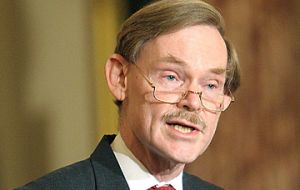MercoPress. South Atlantic News Agency
World Bank chief calls for a return to the gold standard
 “Markets are using gold (‘the old money’) as an alternative monetary asset” says Robert Zoellick
“Markets are using gold (‘the old money’) as an alternative monetary asset” says Robert Zoellick World Bank President Robert Zoellick has called on bickering G-20 nations to bring gold back into the global monetary system as an anchor to guide currency movements.
In a column published in Monday's Financial Times, World Bank President Robert Zoellick wrote that an updated gold standard could help retool the world economy amid tensions over currencies and the United States' monetary policy.
Looking ahead to this week's meeting of the Group of 20 (G-20) nations in Seoul, the former US trade representative said the world needed a new regime to succeed the Bretton Woods II system of floating currencies, which has been in place since the fixed-rate currency system linked to gold broke down in 1971.
Although the gold standard helped guard against inflation, it was abandoned because it did not allow for the flexible monetary policy many economists believe is essential in counteracting economic shocks.
“Although textbooks may view gold as the old money, markets are using gold as an alternative monetary asset today” Zoellick wrote.
The new system ”is likely to need to involve the dollar, the euro, the yen, the pound and a renminbi (Chinese yuan) that moves towards internationalization and then an open capital account“ he said. ”The system should also consider employing gold as an international reference point of market expectations about inflation, deflation and future currency values.“
Zoellick's comments came amid fears of a so-called ”currency war” that would see countries jostle for trade advantage by massaging their exchange rates lower. The United States has led accusations that China cheats in world trade by artificially weakening its currency.
But China and Germany, both major exporters, have complained that Washington's policy of quantitative easing - effectively printing money - is weakening the dollar and harming emerging markets' competitiveness.
Investors are pumping dollars into emerging markets in search of higher yields, and the potentially destabilizing impact of this, along with big current account deficits and China's reluctance to let the Yuan appreciate faster, are set to dominate the G-20 summit on Thursday and Friday.
France, which takes over the G-20 chair after this week's summit, says it plans to work on a new international monetary system to bring greater currency stability.
Beijing's central bank chief has suggested an alternative monetary system based on using the International Monetary Fund's Special Drawing Rights, a notional unit of value based on a basket of major currencies, instead of the dollar as the sole global reserve currency.
Zoellick said a new monetary system would take time to develop and should be part of a package approach including possible changes in International Monetary Fund rules to review capital as well as current account policies, and linking IMF monetary assessments to World Trade Organization obligations.
He also called on the G-20 to forge structural reforms, including the promotion of domestic demand in China and the reduction of debt in the United States.




Top Comments
Disclaimer & comment rules-

-

-

Read all commentsThe world must leave Americans alone with their green papers. They are the real fault, but on the face of this planet.
Nov 08th, 2010 - 05:30 pm 0Hardly, #1. This is a global problem created and perpetuated by ALL players. No one country these days has the power (monetarily) to be given all the blame. Now would be the time for fact-based objective analysis and solutions, not a bunch of rabid blame-gaming for whatever political or personal purpose.
Nov 09th, 2010 - 10:34 pm 0El Supremo, you repeat phrases, you don't know what's behind it.
Nov 10th, 2010 - 12:13 am 0It's not hardly, this is a glogal problem created by ALL players including my country paying for this country's debts firstly by using their money. That's why we use the DOLLAR, you gagger! Or what do you think, because green is pretty?
“The dollar's status as the world's reserve currency has become a facet of U.S. power, allowing the United States to borrow EFFORTLESSLY and sustain an assertive foreign policy.” Effortlessness that we pay for.
http://www.cfr.org/publication/22408/how_dangerous_is_us_government_debt.html
http://www.cfr.org/publication/22408/how_dangerous_is_us_government_debt.html
The U.S. is already bankrupt because it has a debt that is almost four times the size of its economy, but like a shark without the stomach, it's still eating and shaking.
Commenting for this story is now closed.
If you have a Facebook account, become a fan and comment on our Facebook Page!